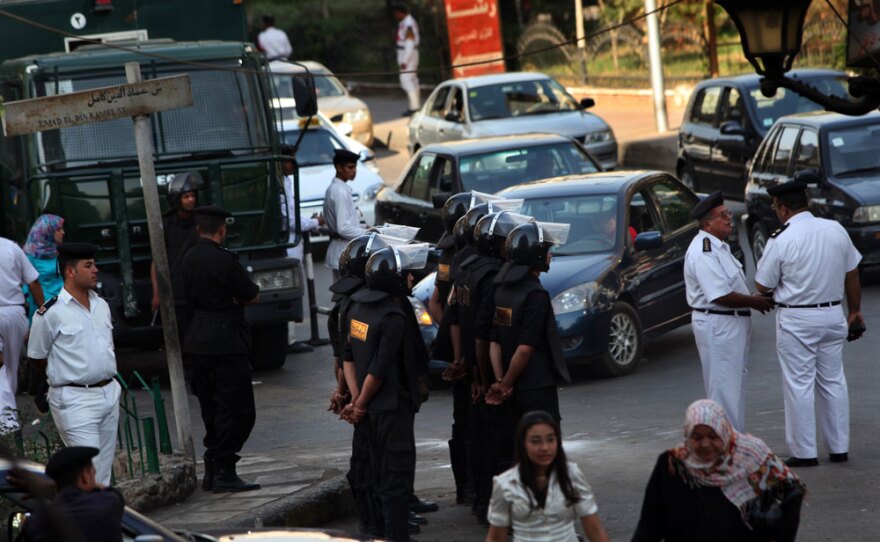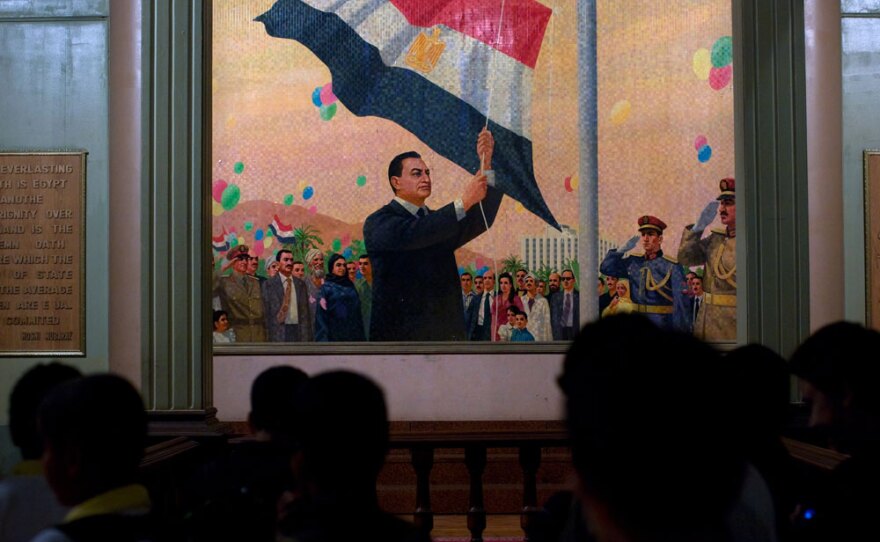Editor's note: As Egyptians prepare to go to the polls Sunday to elect a new parliament, NPR's Soraya Sarhaddi Nelson this week examines life in the Arab world's most populous country with on-air reports on Morning Edition, Web dispatches and images by freelance photographer Holly Pickett.
Most Egyptians cannot remember a time when Hosni Mubarak wasn't their president. After 29 years in office, he is the longest serving ruler of Egypt since the mid-19th century.
Even though he is 82, with rumors swirling about his failing health, senior members of his ruling party are adamant that Mubarak will run again in next year's presidential election.
But not all Egyptians are in favor of Mubarak staying in power. A growing number of them are fed up living in what they see as a police state under his iron-fisted rule and in a country whose economy has failed to lift enough people out of poverty.
In a televised appeal last month, Mubarak acknowledged that Egyptians face many challenges. He added: "But we continue on our path with confidence knowing we are on the right track."
Many analysts and critics of Mubarak disagree. How Egypt is faring on paper is one thing, they say, but quite another in the daily lives of this country of 80 million people.
Economy Weak, Corruption Rampant
According to Egyptian figures, unemployment is in the single digits, and the economy was growing at a healthy rate of 7 percent until the global economic crisis hit.
On the ground, the economic picture is far more dismal. A growing majority of Egypt's population is scraping by on less than $100 a month. And with a disappearing government safety net, even Egyptians who have steady jobs and pensions are increasingly living in shantytowns and tents because they can't afford anything else.
Government corruption is also a significant problem. At the highest levels, there are conflicts of interest. Several top government ministers are linked to businesses their ministries regulate. The courts are full of cases attacking shady land deals that benefit developers and politicians, and strip Egyptians of public land.
Taking their cue from their superiors, many public servants also turn to citizens, soliciting bribes in order to boost their meager government salaries.
Egyptian historian Mahmoud Sabit cites his own experience with his rental property.
"Now, that shop at one time had been operating as a business. The municipality says no, it was never a shop, you have to start all over again," he says. "In other words, they are compelling my tenant to bribe them in order to get the license that they should have."
Sabit says he later found the original certificate, so the authorities grudgingly gave him the license without the bribe. These sorts of obstacles hinder business growth, he says.
Egypt's women and minorities are also struggling under Mubarak's regime. Advocates say the Egyptian Constitution addresses their equal rights, but there remain too few laws on the books to enforce those rights.
Hossam Bahgat, director of the Egyptian Initiative for Personal Rights, says discrimination suffered by religious and ethnic minorities as well as those with disabilities is often hidden by the vast number of socio-economic problems plaguing Egypt.
His office has been tracking attacks on certain groups that revealed a troubling trend.
"Between January 2008 and January 2010, we documented 52 violent attacks on Christians or sectarian violence incidents in 17 out of 29 governorates," Bahgat says. "That's vey disturbing because it really is a rate of two violent episodes a month in a majority of governorates."
He says in none of the cases were the perpetrators punished.
Bright Spots In Mubarak Record
Mubarak proponents dismiss such criticisms, however. Mubarak has been very vocal about promoting national unity and leveling the playing field for Egyptian women and minorities.
"Look at women's rights -- 64 minimum seats for women [in the lower house of parliament.] That was a presidential pledge in 2005," says Ali El Dean Hillal, a spokesman for the ruling National Democratic Party.
The new quota applies during Sunday's parliamentary election and raises the total number of seats in parliament to 518.
The spokesman also cites Mubarak's quick reaction to recent al-Qaida threats against churches in Egypt, including stepped up security measures around the buildings.
"When you have this crazy threat to our Christian churches, he made two statements on two successive days that all Egyptians are equal," Hillal says.
Nabil Fahmy, a former Egyptian ambassador to the United States who is now dean of the school of global affairs and public policy at American University in Cairo, also gives Mubarak high marks for what he's accomplished in nearly 30 years.
"You have to look at where Egypt was and what the challenges were when he came to power," Fahmy says, adding that Mubarak was standing next to his predecessor, Anwar Sadat, when he was felled by assassins' bullets in October 1981.
Fahmy says Mubarak has paved the way for increasing democracy. He points out that there are now 24 political parties -- eight times as many as there were when Mubarak took office.
Press freedoms also have expanded, Fahmy says.
"If you look at what is being said in the media in Egypt -- whether satellite television, Internet, the printed press -- it is far beyond anything you can imagine 30 years ago," he says.
Police Brutality In The Spotlight
But like many Egyptians of his generation, 29-year-old Ahmad Maher has a different view of life in Egypt today. The construction engineer says he could fill books with descriptions of everything that is wrong with Egypt after three decades of Mubarak's rule.
He complains that no one in government is accountable to the public.
Maher's discontent about Egypt's current path led him to found the April 6th Youth Movement in 2008 to agitate for political and economic change. Its activities on the Internet and on the streets have become an embarrassing thorn in the government's side.
The group helped draw international attention to the consequences of a "state of emergency" law that was imposed after Sadat was assassinated and that continues to this day.
Critics say the law allows Egyptian security forces to operate with impunity.
April 6th Youth Movement activists joined others in what for many months were weekly protests over the death last summer of Khaled Said in the northern city of Alexandria.
Witnesses say the 28-year-old businessman was dragged away from an Internet cafe by two police officers. They are accused of repeatedly slamming Said's head into nearby stone steps until he was dead.
Said's defenders believe the police targeted him because he had shared an online video showing illegal police activities. Police officials allege Said was a drug peddler.

His mother, Leila Marzou Said, says what happened to her youngest son shows how much the state fails to care for its citizens.
"That's what happens in Egypt," adds another of her sons, Ahmad Said, who is a naturalized American citizen. "We are silent all this time waiting for anyone to do something, and nothing's been done."
The public outrage over Said's death and ensuing international pressure prompted the government to bring the two officers to trial, which is extremely rare in Egypt.
But it hasn't stopped continuing allegations of police abuse. This month, officers from the same precinct implicated in Said's death stand accused once more: This time for allegedly torturing a 19-year-old detainee to death and dumping his bruised body into a canal.
Lack of Impunity
While the situation is troubling, there's little anyone outside the government can do about it, says Gasser Abdel Razek, who is on the board of the Egyptian Organization for Human Rights.
"The impunity would be challenged by one of two things: Either the regime itself correcting the problems -- and it's not under serious pressure to do that, keeping in mind that it only survives because of that security apparatus," he says.

Abdel Razek adds that the other reason the impunity isn't challenged is because of insufficient domestic and international pressure.
That in part may be because on paper, the Egyptian government holds far fewer people without trial under the emergency law than it has in the past. In the mid-1990s, there were about 35,000 such detainees at any given time, many of them from Islamist groups, Abdel Razek says.
"Today, the figures vary from 1,000 to 5,000, so a huge drop in the number of people who are in fact in prison right now without trial," he adds. "The difference now is that it is so random, it comes from all walks of life."
But allegations of police intimidation have increased in recent days in the run-up to Sunday's parliamentary polls -- what many Egyptians see as an orchestrated effort by Mubarak's ruling party to sway the vote. His National Democratic Party controls 70 percent of the seats in parliament and is expected to continue the long grip on power.
In Alexandria, Said Hussein is campaigning for an independent candidate backed by the banned Muslim Brotherhood. Hussein says many shopkeepers in the neighborhood complained to him that police officers came to their places of work weeks ago and forced them to display banners and posters of ruling party candidates.
Some opposition party candidates complain about being harassed or stopped from campaigning outdoors. Campaign workers are sometimes arrested, as happened in Cairo recently.
Two staffers for independent candidate Gameela Ismail were arrested for handing out her fliers before the official two-week campaign period began -- never mind that some ruling party candidates have had their posters and banners up for weeks.
Copyright 2023 NPR. To see more, visit https://www.npr.org. 9(MDAzMjM2NDYzMDEyMzc1Njk5NjAxNzY3OQ001))







